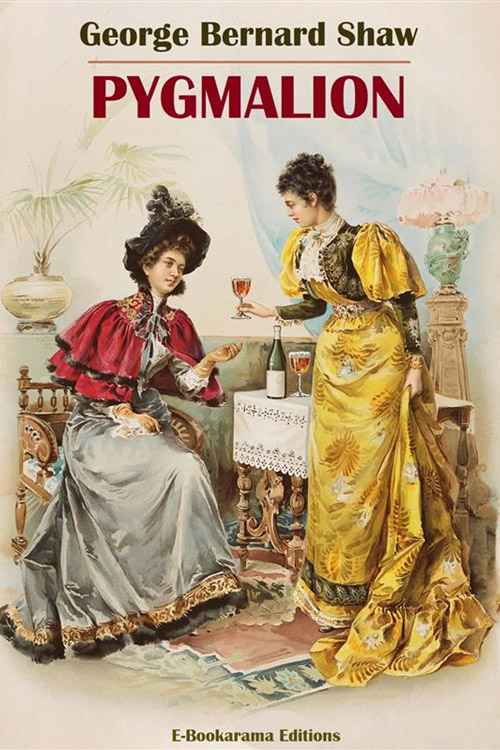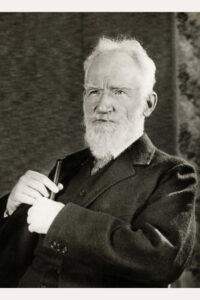
Pygmalion
Pygmalion is a play by Irish playwright George Bernard Shaw, named after the Greek mythological figure. It premièred at the Hofburg Theatre in Vienna on 16 October 1913 and was first presented on stage in German. Its English-language première occurred at His Majesty’s Theatre in London’s West End in April 1914. It starred Herbert Beerbohm Tree as phonetics professor Henry Higgins and Mrs Patrick Campbell as Cockney flower girl Eliza Doolittle.
A group of people are sheltering from the rain. Among them are the Eynsford-Hills, superficial social climbers seeking a living in “genteel poverty”. We first see Mrs Eynsford-Hill and her daughter Clara; Clara’s brother Freddy enters, having earlier been dispatched to secure them a cab (which they can ill afford), but being rather timid and faint-hearted, he has failed to do so. As he goes off again to find a cab, he bumps into a flower girl, Eliza Doolittle. Her flowers drop into the mud of Covent Garden, the flowers she needs to survive in her poverty-stricken world. They are soon joined by a gentleman, Colonel Pickering. While Eliza tries to sell flowers to the Colonel, a bystander informs her that another man is writing down everything she says.
That man is Henry Higgins, a linguist and phonetician. Eliza worries that Higgins is a police officer and will not calm down until Higgins introduces himself. It soon becomes apparent that he and Colonel Pickering have a shared interest in phonetics and an intense mutual admiration; indeed, Pickering has come from India specifically to meet Higgins, and Higgins was planning to go to India to meet Pickering. Higgins tells Pickering that he could pass off the flower girl as a duchess merely by teaching her to speak correctly. These words of bravado spark an interest in Eliza, who would love to make changes in her life and become more mannerly, even though to her, it only means working in a flower shop. At the end of the act, Freddy returns after finding a taxi, only to find that his mother and sister have gone and left him with the cab. The streetwise Eliza takes the cab from him, using the money that Higgins tossed to her, leaving him on his own.
Read or download Book
George Bernard Shaw
George Bernard Shaw (26 July 1856 – 2 November 1950), known at his insistence as Bernard Shaw, was an Irish playwright, critic, polemicist and political activist.
Biography
His influence on Western theatre, culture, and politics extended from the 1880s to his death and beyond. He wrote more than sixty plays, including major works such as Man and Superman (1902), Pygmalion (1913), and Saint Joan (1923). With a range incorporating both contemporary satire and historical allegory, Shaw became the leading dramatist of his generation and was awarded the Nobel Prize in Literature in 1925.
Born in Dublin, Shaw moved to London in 1876, where he struggled to establish himself as a writer and novelist, and embarked on a rigorous process of self-education. By the mid-1880s he had become a respected theatre and music critic. Following a political awakening, he joined the gradualist Fabian Society and became its most prominent pamphlete. Shaw had been writing plays for years before his first public success, Arms and the Man in 1894. Influenced by Henrik Ibsen, he sought to introduce a new realism into English-language drama, using his plays as vehicles to disseminate his political, social, and religious ideas. By the early twentieth century, his reputation as a dramatist was secured with critical and popular successes, including Major Barbara, The Doctor’s Dilemma, and Caesar and Cleopatra.
Shaw’s views were often contentious; he promoted eugenics and alphabet reform and opposed vaccination and organized religion. He courted unpopularity by denouncing both sides in the First World War as equally culpable, and although not a republican, castigated British policy on Ireland in the postwar period. These stances had no lasting effect on his standing or productivity as a dramatist; the inter-war years saw a series of often ambitious plays, which achieved varying degrees of popular success. In 1938 he provided the screenplay for a filmed version of Pygmalion for which he received an Academy Award. His appetite for politics and controversy remained undiminished; by the late 1920s, he had largely renounced Fabian Society gradualism, and often wrote and spoke favorably of dictatorships of the right and left—he expressed admiration for both Mussolini and Stalin. In the final decade of his life, he made fewer public statements but continued to write prolifically until shortly before his death, aged ninety-four, having refused all-state honors, including the Order of Merit in 1946.
Since Shaw’s death, scholarly and critical opinions about his works have varied. However, British dramatists have regularly rated him as second only to Shakespeare; analysts recognize his extensive influence on generations of English-language playwrights. The word Shavian has entered the language as encapsulating Shaw’s ideas and his means of expressing them.






